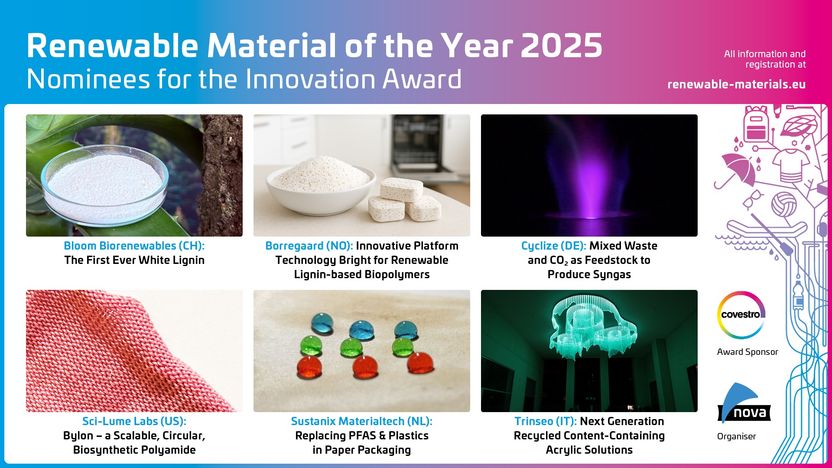Renewable Materials Conference 2025: Nominees for the Innovation Award Unveiled
Advertisement
The Renewable Materials Conference (RMC), organised by the nova-Institute, will present leading solutions and innovations for replacing fossil carbon with biomass, CO₂ utilisation and recycling. The growing success of RMC demonstrates that its unique concept of presenting all solutions for renewable materials at a single event is proving successful. In just a few years, the conference has established itself as the global meeting place for the renewable carbon economy. During the conference, the winner of the innovation award “Renewable Material of the Year 2025” will be elected by the audience.

Renewable Material of the Year 2025 – Nominees for the Innovation Award
nova-Institut GmbH
RMC covers the entire value chain from alternative carbon feedstocks, the chemical industry, the materials sector, product manufacturers to brand owners, as well as investors and policy makers. The last conference in June 2024 attracted nearly 500 participants from 32 countries, 90 % of them from the industrial sector. This year more than 500 participants are expected to attend 75 presentations, 20 panel discussions and up to 12 workshops.
Five highly relevant conference topics
Defossilisation of the Chemical Industry: More than 90 % of the carbon embedded in chemicals and plastics is fossil carbon from the ground, which needs to be replaced with biogenic, captured and recycled carbon. Chemical companies, start-ups and industry associations will present their concepts, strategies and success stories for the future of a sustainable and competitive chemical and plastics industry. Topics include alternative feedstocks, alternative naphtha, electric cracker and non-cracker commodity production via methanol and ethanol, biotechnology and biorefineries and more. This session includes 14 presentations, with five additional talks focusing on lignocellulosic biorefineries and lignin utilisation.
Fine Chemicals: The global fine chemicals market, valued at US$ 180 billion, is experiencing a surge in demand for bio-based solutions. Because fine chemicals are high-value and specialised ingredients for essential products such as pharmaceuticals, cosmetics, personal care products, food additives, etc., their demand remains independent of economic cycles. Advances in biotechnology and biocatalysis are driving the development of high-purity compounds and sustainable processes. Overcoming challenges such as scalability and cost effectiveness is expected to unlock the market potential in this transition. Fine chemicals companies will present their achievements and latest developments in six presentations.
Fossil-free Plastics: 95 % of all plastics today are derived from fossil carbon from the ground – globally 4 % are derived from recycling and 1 % from biomass. There is a growing demand for fossil-free plastics in several product groups. Start-ups and established companies will present their polymer and plastic innovations based on biomass, captured CO₂ and recycling. These include packaging, consumer goods, automotive, textiles and high-performance applications. With 22 presentations, the conference will provide brand owners with a unique insight into alternatives to fossil plastics. They will benefit from cross-sectoral discussions and networking. As part of this session, the six selected nominees will compete for the “Renewable Material of the Year 2025” Innovation Award.
Setting the Frame for Renewable Carbon: The main objective of the Green Deal is to move from a linear to a circular economy – reducing the fossil material use and cutting down on waste. The concept of sustainable carbon cycles was introduced by the European Commission in 2022 and is becoming increasingly influential for future regulations and legislation. Which policy and economic framework is needed to support and guide the transition to renewable carbon? Eleven presentations, panel discussions and workshops will tackle this topic.
Biodegradation: Biodegradable plastics are a complex and controversial issue. The key question is no longer whether biodegradable plastics are a good solution, but in which applications biodegradability makes sense. This is already reflected in the new Packaging and Packaging Waste Regulation (PPWR), which will make biodegradability mandatory for the first applications. In eleven presentations and an accompanying workshop, start-ups, companies and scientists will provide in-depth information on perception, scientific and political developments relevance and impact, applications, benefits and risks.
Six Nominees for the Innovation Award “Renewable Materials of the Year 2025”
Once again this year, the conference’s advisory board had to make a difficult choice in selecting the six most promising materials from the list of many excellent submissions for the “Renewable Materials of the Year 2025” sponsored by Covestro (DE). During the conference, the audience will elect the winner from the following nominees:
Bloom Biorenewables (CH): The First Ever White Lignin - Lignin has been tested in cosmetics for decades due to its advanced anti-UV, antioxidant and antimicrobial properties. However, its use has been hampered by its dark colour and odour. Bloom's selective extraction process can now extract lignin without degradation, preserving it as it is found in a tree. Using breakthrough technology, Bloom can now whiten this ultra-pure lignin while maintaining the integrity of the lignin structure. Bloom's white lignin could be the key to unlocking the use of lignin as a multifunctional ingredient for sustainable cosmetics. This cosmetic ingredient will be launched in 2026.
Borregaard (NO): Innovative Platform Technology Bright for Renewable Lignin-based Biopolymers - Bright is an innovative platform technology that enables the transition from fossil carbon polymers to renewable lignin-based biopolymers. It tailors lignin properties for different applications by precisely adjusting the biopolymer charge and molecular weight. Bright has introduced LignoBrite, the first lignin-based ingredient for home care products such as dishwashing detergents, which replaces persistent polycarboxylates, reduces white deposits and improves shine. The Bright process uses only water, air and energy, without adding fossil inputs to the lignin.
Cyclize (DE): Mixed Waste and CO2 as Feedstock to Produce Syngas - Cyclize enables a circular economy of carbon by using mixed waste and CO2 as feedstock to produce syngas. Syngas is a key building block in the chemical industry and is currently produced primarily from fossil sources. The patented plasma reformer requires only a third of the electrical energy of electrolysis. This advantage makes the production of syngas cost-competitive with fossil syngas. The syngas produced by Cyclize can replace natural gas and thus defossilise the chemical industry without a green premium.
Sci-Lume Labs (US): Bylon — a Scalable, Circular, Biosynthetic Polyamide - Bylon is a scalable, circular, biosynthetic polyamide from protein-rich agricultural waste through a three-step chemical process. First, protein hydrolysis breaks down the waste. Next, novel chemistry at mild temperatures valorises the intermediate into Bylon's monomer – a reaction with >90 % monomer yield. Finally, ring-opening polymerisation creates the Bylon polymer. Bylon is melt processed with a Tm of ~260˚C and a Tg of ~90˚C. The entire production process uses existing infrastructure, offering the scale and cost advantages of traditional petrochemical plastics with the added benefits of using biogenic carbon and being degradable and recyclable at the end of its life.
Sustanix Materialtech (NL): Replacing PFAS & Plastics in Paper Packaging - Stands for proprietary polymers and formulations for 100 % plant-based coatings and additives with excellent hydrophobic and oleophobic properties, and proven industrially recyclable. The new coating technology enables consumer brands and packaging companies to comply with regulations on microplastics, PFAS and packaging waste. It offers a sustainable alternative that is compatible with existing machinery and scalable to over 100 tonnes per month. Replacing PFAS, polyacrylates, microplastics and styrene latex in paper packaging ensures safer food contact and a circular value chain.
Trinseo (IT): Next Generation Recycled Content-Containing Acrylic Solutions - The next-generation depolymerisation demonstration plant (June 2024) expands the types of acrylic waste that can be recycled. The plant uses a proprietary thermolysis process to produce recycled methyl methacrylate (rMMA) that is over 99 % pure, making it a comparable substitute for virgin feedstock. The resulting polymeric recycled acrylic solutions have a 47 % reduction in global warming potential compared to the virgin counterpart. Trinseo plans to scale up this technology in the coming years.
Other news from the department business & finance
Most read news
More news from our other portals
Something is happening in the chemical industry ...
This is what true pioneering spirit looks like: Plenty of innovative start-ups are bringing fresh ideas, lifeblood and entrepreneurial spirit to change tomorrow's world for the better. Immerse yourself in the world of these young companies and take the opportunity to get in touch with the founders.

































































